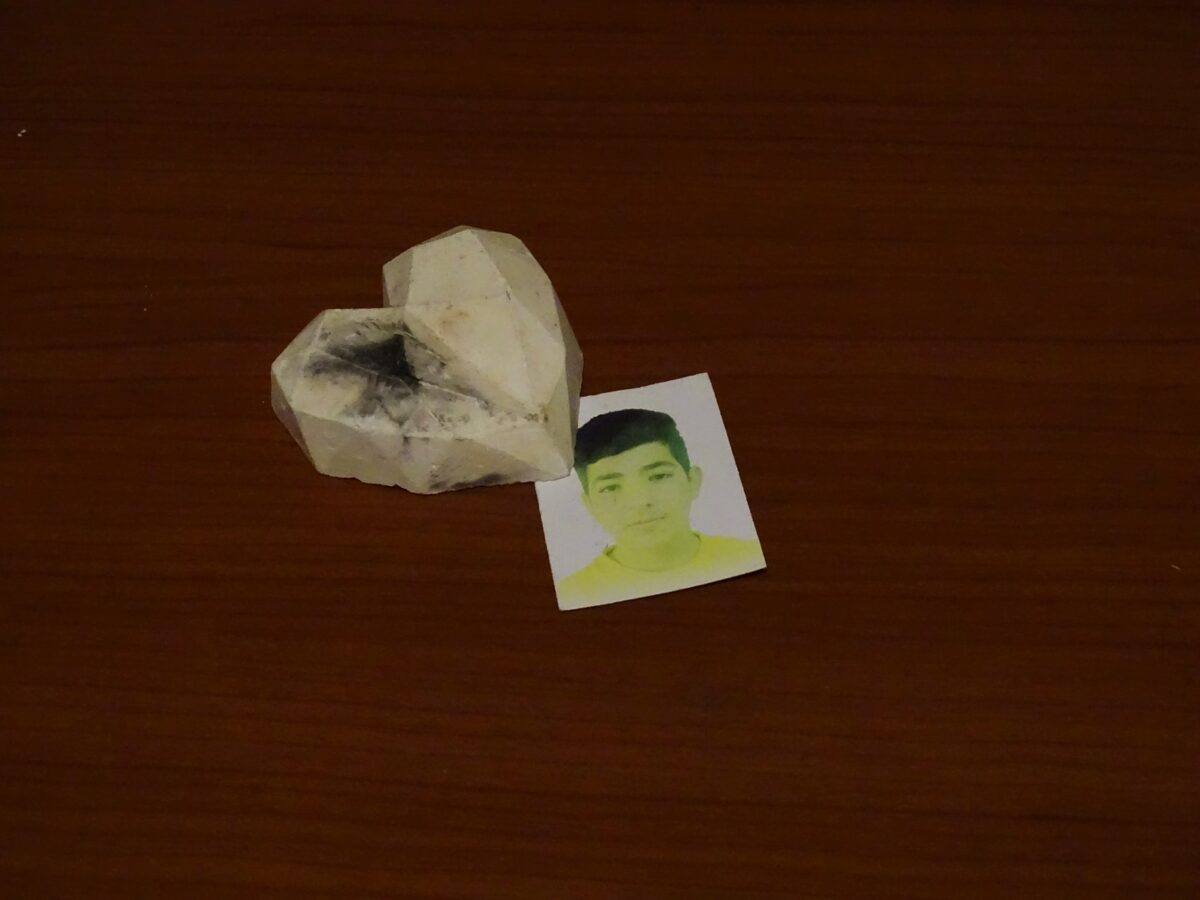
The epic of injustices suffered by a Syrian teenager in Lebanon, in prison for months for crimes he did not commit. On the eve of the hearing which could be definitive for his release, the family tells his story, for the first time, to the press
Syrian. Underage. Innocent. Detained. Two cases on his shoulders. Two charges – false. His fault: birth. There are many ways to begin the story of Yacoub, 14 years old, originally from Qusayr, Homs, resident of Miniara, a predominantly Christian village in Akkar, northern Lebanon. The chronology of injustices suffered, for example. The chain of rights violated in the various prisons of the country, where he has been detained for months. The traumatic childhood in Syria, the death of his father, the journey on foot across the borders, the difficult adolescence in Akkar, with his mother and six siblings, among whom he, the innocent Yacoub, the punished Yacoub, is the youngest. As often happens, the most authentic photograph is the closest: starting from the consequences, to exhume the causes. The goal – to get him out of prison. Thus, with her hands curled up, in mutual torment – the emblem of the anguish of waiting – his 21-year-old sister Hiyam, every Tuesday for four months, has presented herself at the Palace of Justice in Tripoli, Qasr Al-Adl, to try, so far failing, to ask to speak, draw the attention of the judges, pronounce, without her voice breaking in the throat, her brother’s name. Yacoub. To ask – why. Why is he still detained, if he was proven innocent.
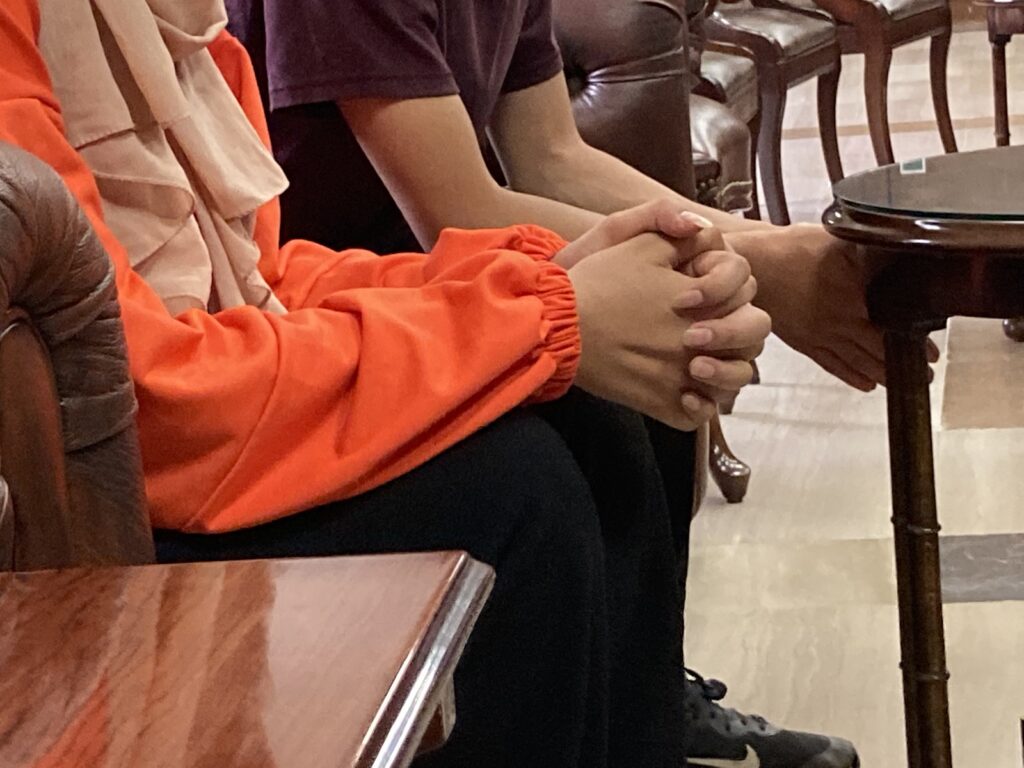
Hiyam in the office of Sami Al-Hassan, President of the Tripoli Bar Association, September 17, 2024. Photo credits: Valeria Rando
The first two times a hearing was called, Hiyam went with her mother, Naziha. They saw Yacoub only once – the first, in mid-May, a few days after the kidnapping: then, systematically, with the excuse of the missing fuel to transport him from the detention center to Tripoli, he, the accused – innocent yet detained – was prevented from reaching the court. Since no one pays for the Syrian, the family is forbidden to see him. The judge – to make the decision to release him. Only Mohammad, among the elder of Yacoub’s siblings – the only one to carry a Lebanese ID – is allowed to visit him in jail: once, every two weeks, to make sure his health is holding up, that he’s okay. Whatever that could mean in one of Lebanon’s overcrowded prisons.
Five times the hearing was postponed: the last one, cancelled on September 10 because the police transport never left Roumieh, had been called for Tuesday, September 24. Today. Unfortunately, it has been cancelled due to the transportation system’s congestion to evacuate the displaced from the south and the Beqaa Valley, after the latest escalation of Israeli violence against Lebanon. Postponed, again, to October 1st. Starting from the third summons, no longer bearing the torment of the woman who has already lost, helplessly, her husband and her homeland – and who cannot maintain that she can’t do anything to save the youngest of her children – Hiyam, daughter and older sister, yet still a young girl, began to wait alone. On one of her eternal Tuesdays of waiting, tormented hands, and doors slammed in her face, she shows me the line of people in front of the door of the judge, Samaranda Nassar, the first investigative judge of northern Lebanon. “From 9 in the morning to 4 in the afternoon, that’s where I’ve waited, every week, hoping to bring my mother some good news. They noticed us, they will free him. And instead, nothing.” In the summer months, when judge Nassar was on vacation, the pace of Hiyam’s visits from Miniara to Tripoli was reduced to one Tuesday a month. That of anguish – quadrupled.
“They don’t even let us hear from him. He calls from prison, once a week, for one minute, completely arbitrarily, often very early in the morning, around seven, and without the call being announced. And so my mother waits with the phone always in her hands, the ringtone on full blast, to hear the same empty words every time. Yes, mum, I’m fine, if you have time, only if you can, come to visit me.”
So the two women wait. Naziha, the mother, anchored to the telephone – and Hiyam, the sister, at the judge’s door: that the first one rings, and the second opens. Both, waiting for Yacoub to return safe home.
Chronicle of a disappearance
We sit on the floor in their living room in Miniara, reopening the wounds of pain of a maimed family while sipping endless cups of bitter coffee: Hiyam, Naziha, and two of her sons – all older than Yacoub. They all agree to let the mother speak first, yet ready to help her when her voice breaks in tears. To my question about which name to use in telling their story, in returning their tragedy to the press – the real ones, or fictional, to protect their identity -, she states, firm: “my name is Imm Yacoub, I am Yacoub’s mother. What other name do you want me to use? We know that we live in the middle of a jungle, where the law of the strongest applies. But we are not afraid.” Then, withdrawn her tears, composedly, “call me Naziha, just Naziha.”
The son’s absence is palpable. On the floor, Hiyam carefully places a clay ashtray he handcrafted, and points out, “it is Yacoub’s work,” and every time his name is mentioned, a silence pervades the room. It is the first time that Naziha, Imm Yacoub, speaks to the press: “At first, I didn’t like the idea of making our pain public. We thought it wasn’t necessary. Then, after a month of detention, despite the lawyers’ aversion, we decided to go for it. We have no other alternatives, so here we are.”
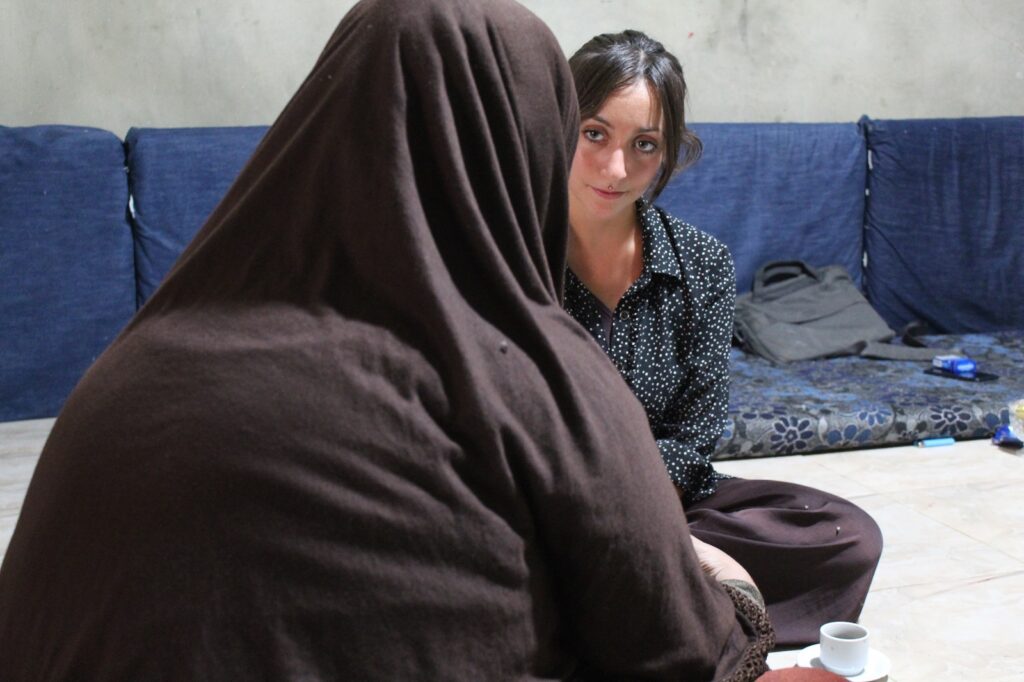
Interviewing Naziha, Yacoub’s mother, in the living room of their house in Miniara, Akkar, September 22, 2024. Photo credits: Theodore Yip
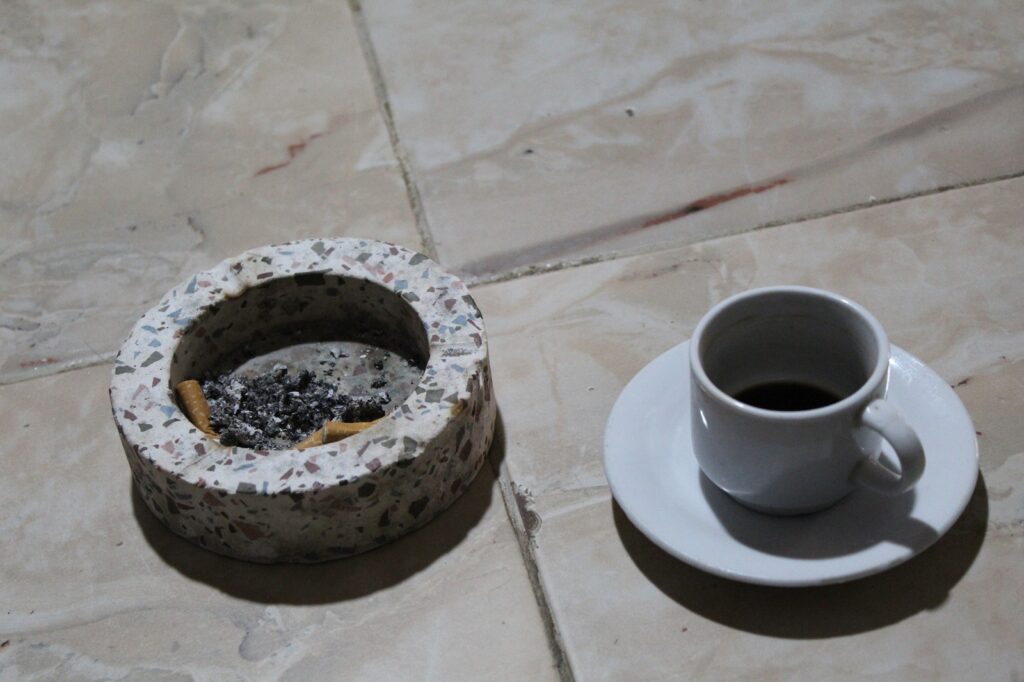
An ashtray handcrafted by Yacoub before his detention next to a cup of coffee his mother prepared during the interview, September 22, 2024. Photo credits: Valeria Rando
The debut of Yacoub’s journey dates back four months ago, on May 13, when – at the height of anti-Syrian hatred, a few weeks after the killing of the coordinator of the Lebanese Forces in Jbeil, Pascal Sleiman – he was accused by a Lebanese neighbor of having stolen his scooter. “But my brother was in Beirut, not in Akkar, it couldn’t have been him,” ensures Hiyam.
Just a few weeks earlier, in Rahbe, another mixed village of Akkar, a Syrian teenager had been arbitrarily accused of raping an eight-year-old Lebanese boy – a charge that was quickly dropped when it became clear that they were just playing. “But the Lebanese family still persists in accusing him of sexual harassment, and since then dozens of Syrians have been forced to leave Rahbe for this fake story,” says Friedrich Bokern, Director of the organization Relief & Reconciliation for Syria (R&R), who for more than eleven years has been living among the villages of Akkar, the poorest region of the country, hosting, in proportion, the highest number of Syrian refugees. And who, during these difficult months, has been accompanying Hiyam to the Tripoli Court, in sign of support.
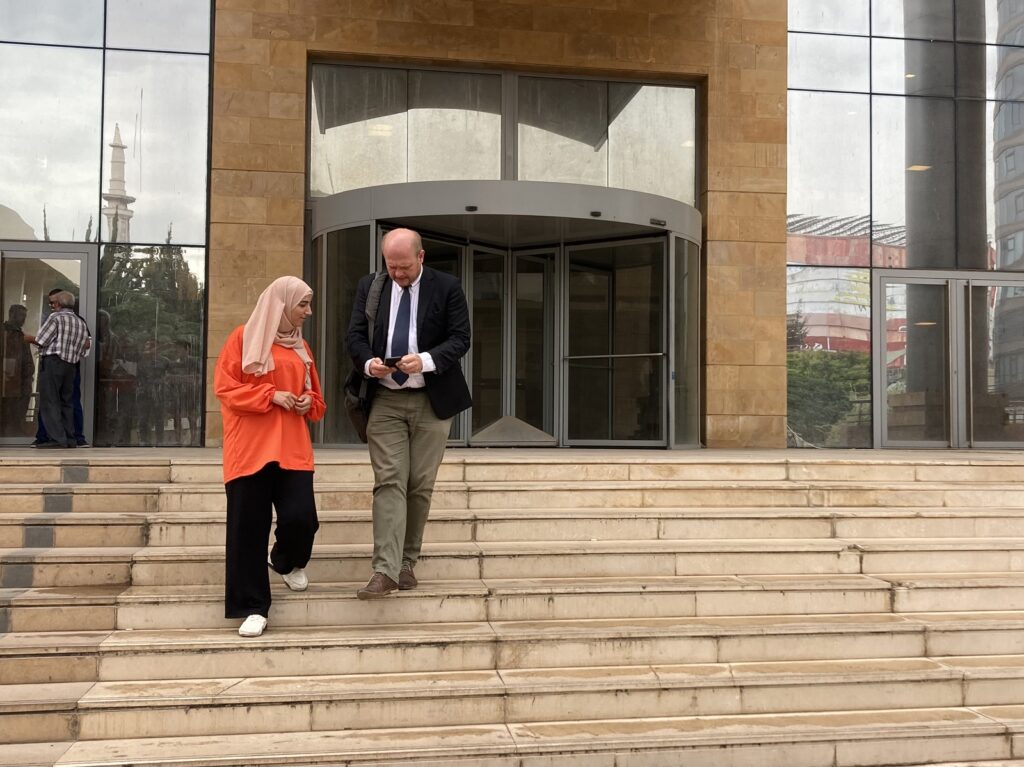
Hiyam and Friedrich in front of Tripoli’s Palace of Justice, September 17, 2024. Photo credits: Valeria Rando
On Monday, September 23, R&R published a release entitled ‘Children Targeted by Lebanese Authorities. Call for Immediate Release of Juvenile Detainees Proven Innocent,’ denouncing several cases of children illegally targeted by Lebanese judicial authorities – retained in Lebanese prisons despite the fact that their innocence was proven in court – which have been brought to the attention of the organization’s field staff of the over the last months. Bokern said in a statement: “How can a broken window justify the detention of a 14-year-old child in jail for more than four months? This is both a breach of Lebanese law and of international norms. The protection of children must be one of the first priorities of any civilized nation,” and he added: “We ask for the immediate release of Yacoub and all other children who are still detained in Lebanon without proper legal procedure or despite being proven innocent.”
It was in this climate of injustice, hatred and xenophobic violence – this climate of scapegoating – that on May 13, a man went to knock on the door of their house in Miniara, asking where Yacoub was, and that he wanted to see him. And thinking that he was a relative of one of his friends, Yacoub’s mother, Naziha, brought him to the stranger. There, at the door of his own house, he disappeared: and since then, he has not yet returned. The man beat him severely, and filmed the scene in a video – which has now been removed – where he forced Yacoub to confess the crime he did not commit. Despite the difficulty of unburying the story again, Hiyam continues: “The next day, it was May 14, a Friday, my mum went to get Yacoub back, where is my son, she asked. And the answer was: your son stole my scooter and I handed him over to Amn Al-‘Am, the General Security. And faced with her desperate crying, he threatened: you are Syrians, I am Lebanese, I have more power than you, let’s see what you can do.”
And so, having dried their tears, the two women said to each other: let’s try to follow the steps of the law. Their documents are in order, Naziha being legal in Lebanon, and Yacoub, a minor, under her protection. “They couldn’t deport him to Syria even if they wanted to. At least in that respect we are safe, al-hamdulillah, thank God,” smiles Hiyam. At the time of the theft, then, the boy was in Beirut: his alibi very strong, certain of his innocence, they turned to the Legal Department of the UNHCR.
Unfortunately, the pace of injustice is much faster than that of bureaucracy, and so, while Naziha and Hiyam chased lawyers and organizations to keep alive the very faint fire of their hopes – approaching the Restart Center for rehabilitation of victims of torture and violence -, Yacoub was transferred, from the Halba General Security, to the northern border with Syria, in ‘Arida, under the threat of forced deportation – despite it being illegal. And from there, to the Mashta Hassan prison, in Wadi Khaled, on the north-eastern border, not far from his hometown in Syria.
“My mother turned to the Niqabat Al-Muhamin – the Tripoli Bar Association, and looked for another lawyer. After a month, on June 10, they finally proved Yacoub’s innocence, and the real thief, head of a criminal moped trafficking network, was put in prison. We paid 200 dollars in release fees, covering the food he consumed in jail, and waited for his return.”
The story, at this point, could end in a usual and easily solvable exchange of culprits, a month of anguish and tears, a slightly high – but affordable – tax, and a celebratory dinner for the boy’s return. Instead, when a week after the verdict Naziha called the Tripoli Court to ask where her son was, she was told: there is another accusation against him from Mashta Hassan, he broke a window while trying to escape. They keep him inside.
For a broken window
“Basically, when he was in his detention cell in Mashta Hassan, he tried, together with another detainee, to break a window and escape, ya haram, poor thing,” says Hiyam. “He’s only 14 years old. And he suffers from psychological trauma from the war in Syria, he doesn’t like being in closed spaces, maybe that’s why he did it, he wasn’t lucid.”
For the same reason – claustrophobia – Yacoub dropped out of school. Having arrived in Lebanon from Qusayr, Syria, when he was six years old, he was a student in one of the R&R facilities for a few years, continued for another three, then stopped. “In the classroom, he used to feel he was jailed, he’s extremely active, and no teacher could follow him,” the sister continues.
In June 2013, Qusayr, a predominantly Sunni town in the province of Homs, eight kilometers from the Lebanese border, was seized by Hezbollah – an ally of the Syrian regime – in a brutal battle that lasted for weeks. Their father died while fighting for the Free Syrian Army, and a month after the loss they set out, their mother Naziha, Hiyam, Yacoub, and their other five siblings, towards the Lebanese border, under constant shelling by enemy troops.
The Sunni population, together with the rebel fighters, was forced to flee: “There were 60 thousand of us, and many fell on the way, and we had to leave them behind on the street, their bodies covered in stones, nothing more,” Hiyam revokes, despite having been just a child back then. They walked through the mountain paths, from Qusayr down to Yabrud. “They called it al-fatha, the opening, and allowed us to enter Lebanon through Arsal.”
When Hiyam, Yacoub and the rest of the family arrived in Lebanon – from Arsal to Akkar, where they still reside – the girl risked losing an arm due to the shrapnel from a grenade. “I still have some photographs,” she laughs. But when she talks about her brother she immediately turns serious again. “Keeping him in prison without trial seems to have become the country’s right,” she says. “The center in Mashta Hassan wanted the cost of the broken window back. So they moved him to Batroun, where we were allowed to meet him. My mother begged him to tell the truth in front of the judge, not to lie. He just broke a window, since when is this a crime punishable by prison? Indeed, it is a scandal.”
Naziha echoes: “How is it possible that they noticed a broken window, but not that a kid is unjustly in prison, without trial, without the right to go to hearings, because no one pays for the driver? Is this window made of gold, perhaps?” she wonders with bitter sarcasm, her voice broken. “Even if you try to put a cat in a cage, it will try to escape. It is not a crime, the right to look for one’s own freedom. My son, for having committed no crime, was forced into a tiny cell with people indicted for major crimes. The problem is not him, my beloved Yacoub, the problem is the prisons’ system itself.”
And in vain they’re still waiting for the hearing, eventually postponed to next Tuesday, October 1st. Only once, was he allowed to be present: and there he confessed what happened, the escape attempt, the help he received from another prisoner, Ahmad, now in Roumieh, to break the window with a lock pick. “Let the judge decide, in short, but at least knowing the truth. The lawyer got terribly angry, ‘I told him to deny, or at least to say that he had run away in the middle of a panic attack’ she told my mother after the hearing. But as Syrians, we know, lying can only worsen our condition.” Listening to her, in her maturity, one doubts that Hiyam is just 21 years old.
“The judge in Yacoub’s case, Samaranda Nassar, is very strict. She had already spoken out for the closure of the first case, the theft of the scooter, after having acquitted my brother. Now, before ruling on the second one, the one of the broken window, she wants to meet him again, talk to him, she is extremely meticulous, a quality that is generally associated with good justice. But in this case no, and while we continue to wait, to talk, to beg their attention, Yacoub continues to suffer.”
Without trial, under Lebanese law, one can remain in prison for up to three months, no more. When the time of the absurd Lebanese legality expired, Yacoub was transferred from Batroun to Roumieh prison, further south. From there, he never left. Lawyers consulted told the family that typically, in situations like this, informal payments are expected, hiring a ‘local lawyer,’ as a prison officer advised, proposing a name, “for just 1,500 dollar” – as if the price of justice could be monetized – or, alternatively, the payment of transport, 50 or 100 dollars, a small fee delivered outside the prison, albeit illegal. This is what is usually asked. “But how can you expect from us, Syrians, in a political moment like this, to go to Roumieh prison and offer a bribe to get Yacoub out of there? It’s unthinkable, they would mount a corruption case against me,” she wonders lucidly, while starting to consider abandoning the faculty of Biochemistry to enroll in Law.
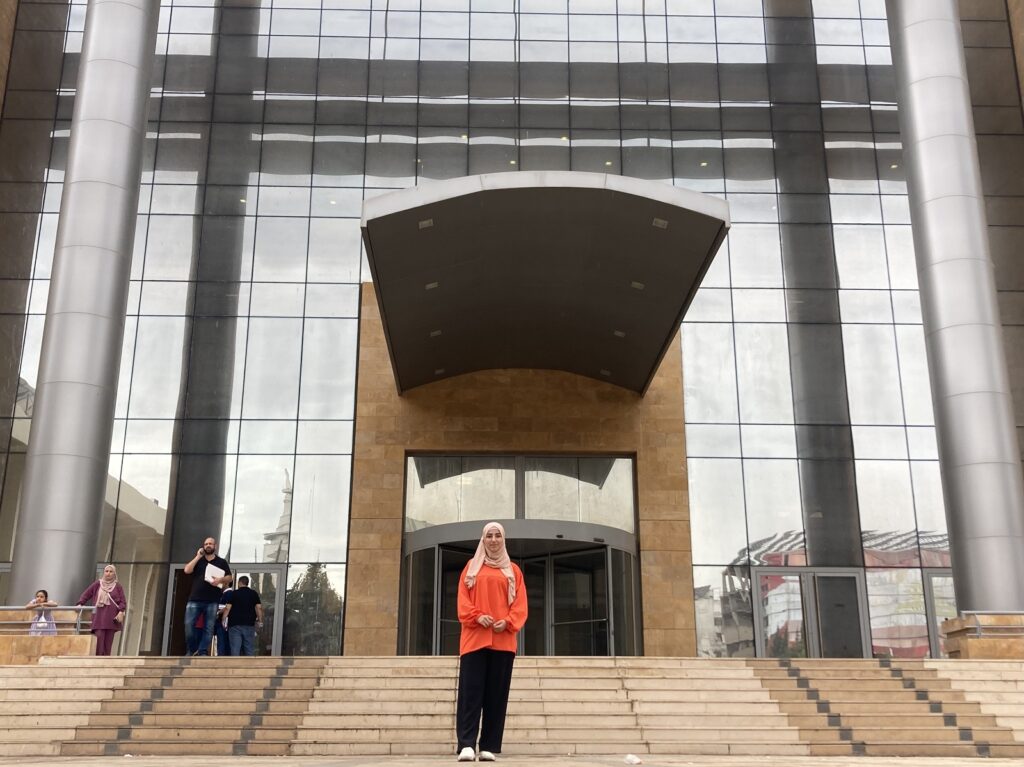
Hiyam in front of Tripoli’s Palace of Justice, September 17, 2024. Photo credits: Valeria Rando
The next steps
When we met, Hiyam and I, it was September 17 – another Tuesday of waiting at the Palace of Justice in Tripoli. There was no official hearing for Yacoub that day. But we went there in the hope – yes, it is still allowed to use this term – of meeting the Naqib, President of the Tripoli Bar Association, Sami Al-Hassan.
“We’re here to try to get a decision from the judge. If we could do it today, tonight or at the latest tomorrow morning, Yacoub would be free, he would be let out of prison. We would pay what we have to pay, as we have already done, and go back home, to celebrate his safety. Then we would deal with his mental health, in a professional manner, but that’s all we’re asking for, an answer. Let our senseless punishment end.”
Though, in the Naqib’s office, no one asks about Yacoub. It’s a ceremonial of handshakes, warm coffee distributed in a set of plain cups, people standing up as a sign of respect, and official photographers. Justice is a recurring word in dialogue. They mention the concept of Abrahamic hospitality, peaceful coexistence, of dissolving all the armies of the world – and of course Israel and Palestine, a moment of silence when Gaza is pronounced – while a Syrian girl, with her innocent brother still in prison, sits in the room. In her place, silent, with one hand in the other, visibly tense. When she finally begins to speak, and says his name – Yacoub – she is interrupted because information is missing, according to those who hold the scepter of justice. Within the means of legality, they promise to help her. We leave the room with a shred of promise, Al-Hassan wants to speak personally with Yacoub’s lawyer, and that’s enough to revive Hiyam’s smile, loosen her crumpled hands in a rush of adrenaline, then make her pick up her phone, send a message to her mother, reassure her. Fi amal, ummi. There is hope.








